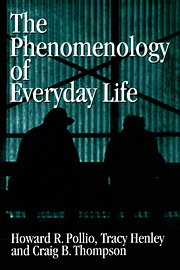Book contents
- Frontmatter
- Contents
- Preface
- PART I EXISTENTIAL PHENOMENOLOGY AND THE SCIENCE OF PSYCHOLOGY
- 1 The Nature of Human Experience
- 2 Dialogue as Method: The Phenomenological Interview
- PART II GROUNDING THE WORLD OF EVERYDAY LIFE
- PART III SELECTED TOPICS FROM EVERYDAY LIFE
- PART IV THE PHENOMENOLOGY OF EVERYDAY LIFE
- References
- Name Index
- Subject Index
1 - The Nature of Human Experience
Published online by Cambridge University Press: 04 August 2010
- Frontmatter
- Contents
- Preface
- PART I EXISTENTIAL PHENOMENOLOGY AND THE SCIENCE OF PSYCHOLOGY
- 1 The Nature of Human Experience
- 2 Dialogue as Method: The Phenomenological Interview
- PART II GROUNDING THE WORLD OF EVERYDAY LIFE
- PART III SELECTED TOPICS FROM EVERYDAY LIFE
- PART IV THE PHENOMENOLOGY OF EVERYDAY LIFE
- References
- Name Index
- Subject Index
Summary
In the beginning of his classic monograph, “A Stroll through the Worlds of Animals and Men” (1934/1957), the European naturalist Jakob von Uexkull invited his readers to “blow, in fancy, a soap bubble around each creature to represent its own world, filled with the perceptions it alone knows.… Through the bubble we see … the world as it appears to the animal (itself), not as it appears to us. This we may call the phenomenal world or the self world of the animal.” Von Uexkell then went on to suggest that for many biologists these worlds will be invisible because of a prior commitment to conceptualizing animal life in purely mechanical terms. He advises us, as enlightened readers, to regard all animals, the human being included, not as machinelike objects but as subjects who live in their unique worlds that are as “manifold as the animals themselves.”
Von Uexkull was not the only one of psychology's ancestors to call for a nonmechanistic and phenomenal view of human and animal life. A few years earlier, William James (1890) had written about the uniqueness of human perception, specifically in regard to four different Americans traveling in Europe:
One … will bring home only picturesque impressions – costumes and colors, parks and views and works of architecture, pictures and structures. To another, all this will be non-existent; and distances and prices, population and drainage arrangements, door and window fastenings, and other useful statistics will take their place. A third will give a rich account of the theaters, restaurants, and public balls, and naught besides; whilst the fourth will perhaps have been so wrapped in his own subjective broodings as to tell little more than a few names of places.
(James, 1890, pp. 286–287)- Type
- Chapter
- Information
- The Phenomenology of Everyday LifeEmpirical Investigations of Human Experience, pp. 3 - 27Publisher: Cambridge University PressPrint publication year: 1997



